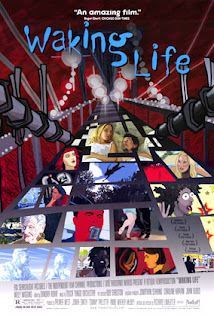Waking Life
You have to give Richard Linklater his due--he doesn't play it safe when making films. He broke through last year with Boyhood, which was a 12-year-in-the-making film, but he's also experimented with animation, such as with A Scanner Darkly and Waking Life, made in 2001. Waking Life uses Rotoscope to animate what is essentially an existential exercise that examines the difference between dreams and reality.
The film opens with two children playing that paper-flower game, and a young boy is told "Dream is destiny." We then follow a young man, played by Wiley Wiggins, as he travels around, listening to various philosopher types talk about philosophical type things. Gradually he, as well as the audience, realize that he is in a dream, and eventually he becomes considered that he can't get out of it.
A lot of Waking Life is the kind of stuff you talk about in a dorm room in the wee hours of the morning, such as whether one can manipulate one's dreams (lucid dreaming) or why do dreams seem like reality. At one point Wiggins, realizing he is in a dream, asks a woman he is talking to, "What is it like being a character in a dream?" There a lot of pronouncements that could be accompanied by the signal for "blowing my mind."
There's a lot to digest here. Ethan Hawke and Julie Delpy show up, perhaps playing their "Before" characters, talking about collective consciousness and whether we can be reincarnated. Delpy notes that since the population has doubled in the last forty years, only half of us could have past lives. There is also a short and totally unconnected segment with a prisoner audibly reciting what he is going to do with those responsible for putting him there, starting with cutting off their eyelids. Another man drives the streets shouting his beliefs on a bullhorn, which suggests there is a thin line between serious philosophy and the tinfoil-hat brigade.
At first I found a lot of Waking Life pretentious, with the animation, which makes everything look like an acid trip, hiding its tedium. But when I got the notion that Wiggins was stuck in a dream, it became interesting. Like Inception, which would come many years later, there are indications you are in a dream--if you can't read your clock radio, or if flipping the light switch does nothing.
I ended up liking the film because I've always been fascinated by dreams and why we even have them. Is there something evolutionary about them? One person suggests that knowing the difference between dreams and reality is a necessity, if only to distinguish actual threats from predators. But today people are fairly safe from predators. What function do dreams, and the ability to separate them from reality, hold for us now? Could we simply exist in a dream state? Sometimes I wish I could.
The film opens with two children playing that paper-flower game, and a young boy is told "Dream is destiny." We then follow a young man, played by Wiley Wiggins, as he travels around, listening to various philosopher types talk about philosophical type things. Gradually he, as well as the audience, realize that he is in a dream, and eventually he becomes considered that he can't get out of it.
A lot of Waking Life is the kind of stuff you talk about in a dorm room in the wee hours of the morning, such as whether one can manipulate one's dreams (lucid dreaming) or why do dreams seem like reality. At one point Wiggins, realizing he is in a dream, asks a woman he is talking to, "What is it like being a character in a dream?" There a lot of pronouncements that could be accompanied by the signal for "blowing my mind."
There's a lot to digest here. Ethan Hawke and Julie Delpy show up, perhaps playing their "Before" characters, talking about collective consciousness and whether we can be reincarnated. Delpy notes that since the population has doubled in the last forty years, only half of us could have past lives. There is also a short and totally unconnected segment with a prisoner audibly reciting what he is going to do with those responsible for putting him there, starting with cutting off their eyelids. Another man drives the streets shouting his beliefs on a bullhorn, which suggests there is a thin line between serious philosophy and the tinfoil-hat brigade.
At first I found a lot of Waking Life pretentious, with the animation, which makes everything look like an acid trip, hiding its tedium. But when I got the notion that Wiggins was stuck in a dream, it became interesting. Like Inception, which would come many years later, there are indications you are in a dream--if you can't read your clock radio, or if flipping the light switch does nothing.
I ended up liking the film because I've always been fascinated by dreams and why we even have them. Is there something evolutionary about them? One person suggests that knowing the difference between dreams and reality is a necessity, if only to distinguish actual threats from predators. But today people are fairly safe from predators. What function do dreams, and the ability to separate them from reality, hold for us now? Could we simply exist in a dream state? Sometimes I wish I could.



Comments
Post a Comment